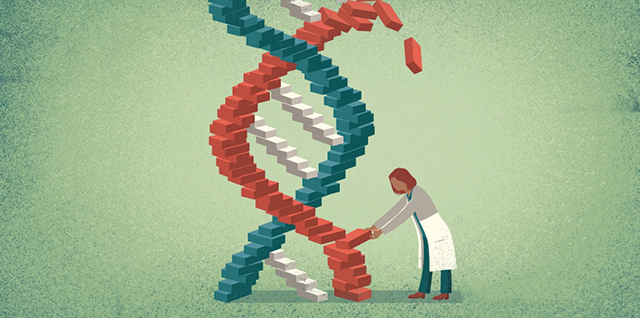Breakthrough or bad science?
“基因编辑婴儿”打开了潘多拉魔盒?
It's long been a scientific dream: to inoculate people against terrible diseases before birth. Recently a Chinese biological researcher brought that possibility in front of the whole world.
令人类先天对重疾免疫是科学界长久以来的梦想。最近,中国的一位生物科学研究者将这种可能性展现在了世人面前。
On Nov 26, He Jiankui from Shenzhen, Guangdong province announced the birth of healthy twin girls, Lulu and Nana, earlier in the month. They came into being via in vitro fertilization with gene editing technology that protected them from HIV infection.
11月26日,来自广东深圳的贺建奎宣布,一对名为露露和娜娜的双胞胎于11月初健康诞生。这对双胞胎在体外受精时采用了基因编辑技术,使她们出生后即能天然抵抗艾滋病。

The reaction to his announcement was explosive. China's Ministry of Science and Technology has cooperated with other departments to investigate He's project. In a signed open letter released on Nov 27, 140 Chinese researchers in HIV/AIDS from China and abroad condemned the "unethical" research. They questioned the need for He's project. The letter said that there are many treatments that prevent babies born to HIV-positive parents from being infected. In fact, there are many drugs for this.
贺建奎宣布的这一消息引起了轩然大波。中国科技部已联合相关部门对该项目进行调查。11月27日,140多位海内外华裔艾滋病研究专业人士发表署名公开信,谴责这项研究“无视伦理道德底线”。信中还表示,在防止新生儿被携带艾滋病病毒的父母感染方面,有多种有效的医学干预手段。事实上,目前已有许多这方面的有效药物。
Until now, there has only been gene editing research on faulty embryos. The research only went ahead when it was clear that children would have terrible diseases. But even this research is controversial.
到目前为止,人类只在畸形胚胎上进行过基因编辑研究。只有在明确孩子将患有严重疾病的前提下,这项研究才能继续下去。但尽管如此,这项研究也充满争议。
The idea that research could find ways to switch off genes that cause cancer may be exciting, but it is also troubling.
研究能够找到敲除致癌基因的想法或许令人感到激动,但同时也令人感到不安。
There are worries about babies that are designed to be superior, with better looks and above average skills. People are also concerned that gene editing changes the human genome, which means that changes will be handed onto future generations and spread through the population.
有人担心将会出现更漂亮、更聪明的超级“定制宝宝”。还有人担心基因编辑将会改变人类基因组,从而传递给后代,并在全人类中传播开来。
Such research also raises ethical questions. If successful baby alteration gene technology becomes available, who will be able to use it? Will it be only the wealthy, who can afford it? And if people live much longer lives, will there be an effect on the size of the world population?
这项研究也引发了道德伦理问题。如果我们能够成功地运用编辑婴儿基因的技术,那么谁能够使用这项技术呢?只有那些支付得起高昂费用的富人才能使用吗?如果人类的寿命变得更长了,对全球人口的数量是否也会产生影响呢?
Those questions are difficult to answer. But one thing is certain: If the cures have the potential to affect not just those who are treated, but the human population as a whole, it's important to ensure that scientific advances aren't getting too far ahead of our understanding of how to use them.
这些问题都很难回答。但有一件事是确定的:如果这些治疗方法影响到的不只是接受治疗的人,而是整个全人类,那么,确保科学进步不会太过超前于我们对其的认知,这点至关重要。












